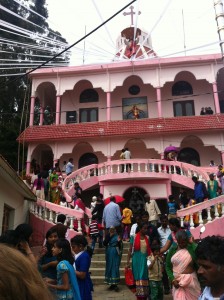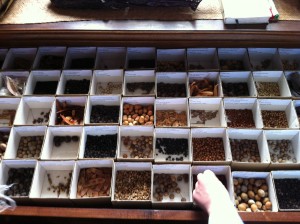From Cole Norgaarden
It’s the end of Week 5 and the reality of our semi-permanent presence in this place—India, Keystone, Kotagiri, the Nilgiri Biosphere Reserve—is beginning to truly sink in. Weekly outings to the market (which we can now proudly navigate independently) have become full of familiar faces from campus, and the town, which initially seemed overwhelming despite its small size, now feels a little more like home. The speaking, eating, and clothing habits we brought from home have all morphed in one way or another to reflect the new environment around us, to the point where I find myself talking like a Tamil English-speaker to my American peers. Teatime, a previously alien concept, is now a crucial component of our daily routine. And as we continue to accumulate items from Keystone’s network of Green Shops, we would like to think that our visual appearance is slowly beginning to blend in as well. Thanks to the unending patience of our local counterparts, together we have been able to foster a genuine, if only personal, sense of belonging in the community where we are living. Lately, it’s become harder to remember that I have been in a foreign country for a full month and will be here for three more.
 In fact, I’ve heard several people in our cohort remark at how they have forgotten that they are in India, or that at times it doesn’t feel like they are in India at all. I think this is an interesting thought to explore, considering that in some ways we couldn’t be more in India. Experiences like conversing with traditional healers, visiting villages deep in the hills, and living with six youth who have grown up within the local culture have already given us a much more intimate look at life in India than most outsiders would ever receive. At the same time I feel that these experiences may also be the reason that we are confronting some difficulty in reconciling our preconceived notions with our actual observations. Before arriving in India, the expectations of those of us coming from the US had been conditioned by the highly objectified version of Indian culture that appears in the media. Books like Katherine Boo’s Behind the Beautiful Forevers and Kiran Desai’s The Inheritance of Loss, plus popular films like Slumdog Millionaire have planted foundational ideas in our minds about what India is, or should be.
In fact, I’ve heard several people in our cohort remark at how they have forgotten that they are in India, or that at times it doesn’t feel like they are in India at all. I think this is an interesting thought to explore, considering that in some ways we couldn’t be more in India. Experiences like conversing with traditional healers, visiting villages deep in the hills, and living with six youth who have grown up within the local culture have already given us a much more intimate look at life in India than most outsiders would ever receive. At the same time I feel that these experiences may also be the reason that we are confronting some difficulty in reconciling our preconceived notions with our actual observations. Before arriving in India, the expectations of those of us coming from the US had been conditioned by the highly objectified version of Indian culture that appears in the media. Books like Katherine Boo’s Behind the Beautiful Forevers and Kiran Desai’s The Inheritance of Loss, plus popular films like Slumdog Millionaire have planted foundational ideas in our minds about what India is, or should be.
 In some ways, I expected that coming here would simply be a deeper immersion in these same images. But staying in one place for a month has a way of upsetting stereotypes and producing a sort of hybrid reality. Witnessing the sheer diversity of people, and starting to recognize those I know from my own life in their faces, is just one example of the process of normalizing our experience that is under way. After five weeks, I now crave mushroom paneer or masala dosa much more often than food from home; encounters with the gaur, which were the subject of intense enthusiasm at the beginning, have become nonchalant. The objectified India in my head resurfaces every time a cow interrupts traffic or I start into another meal served on banana leaf, but these features have different meaning within the nuanced context we are attempting to piece together.
In some ways, I expected that coming here would simply be a deeper immersion in these same images. But staying in one place for a month has a way of upsetting stereotypes and producing a sort of hybrid reality. Witnessing the sheer diversity of people, and starting to recognize those I know from my own life in their faces, is just one example of the process of normalizing our experience that is under way. After five weeks, I now crave mushroom paneer or masala dosa much more often than food from home; encounters with the gaur, which were the subject of intense enthusiasm at the beginning, have become nonchalant. The objectified India in my head resurfaces every time a cow interrupts traffic or I start into another meal served on banana leaf, but these features have different meaning within the nuanced context we are attempting to piece together.
I’m Indian and seen a little bit of West. I read with a lot of interest your account of Indian countryside. And loved it.
Gandhi said that India lives in villages. It is more true now — when Indian cities are fast changing their “Indian” character — that it was during his lifetime.
I would like to point out that there is no typica “Indian” village. A village of Assam is more different in character from a village of Kerala than probably a typical Dutch village from German one.
Good luck with your “Discovery of India”.
I am so glad for the fact that you managed to travel there, I also as a student would like to apply to get there, because I love to travel just as I read here https://papersowl.com/examples/water-pollution/ about water pollution, it seems to me a big disaster, is it really true that there is extremely dirty water there? Because one of the purposes for which I would like to go there is to bathe in the sea.